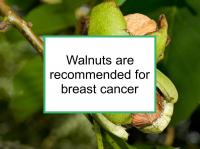Walnuts (Juglans regia) have the highest total phenolic content, flavonoid content, and antioxidant activity of nuts commonly consumed in the U.S. Walnuts are a very good source of alpha-linolenic acid (ALA, an omega-3 fatty acid), gamma-tocopherol, and manganese. Walnuts also contain significant levels of magnesium and copper.
In addition, walnuts are a good source of β-sitosterol, fiber, melatonin, vitamin B6, and zinc, as well as some beta-tocopherol, delta-tocopherol, folate, and selenium. Walnuts are also a good source of pedunculagin, an ellagitannin which is hydrolyzed to produce ellagic acid, which is converted by microflora in the gut to urolithin A and other urolithins. Despite their high caloric and fat content, adding a moderate amount of nuts to the diet has been shown not to result in weight gain.
Breast cancer-related effects of consuming walnuts
Walnuts, walnut oil and walnut micronutrient consumption is associated with reduced breast cancer risk. Walnuts are a source of a variety of compounds with anti-cancer activities, including some that have been shown to increase the beneficial effects of breast cancer treatment.
Animal and cell studies
Walnut consumption has been found in several studies to significantly reduce breast tumor incidence and size in laboratory mice. For example, one study reported that a diet including walnuts reduced the size of tumors produced by injecting triple negative (ER-/PR-/HER2-) breast cancer cells into mice. Walnut extracts and walnut compounds have also been shown to inhibit the growth and proliferation of both hormone receptor positive (ER+/PR+) and triple negative breast cancer cells.
Human study
One 2019 study demonstrated that adding 2 oz. of walnuts per day to the diets of women with breast cancer altered the expression of 456 genes in their tumors during the time between their breast biopsies and lumpectomies approximately two weeks later. The changes were favorable: pathways that promote apoptosis and cell adhesion were activated whereas pathways that promote cell proliferation and migration were inhibited.
Alpha-linolenic acid (ALA)
Consumption of ALA is associated with reduced breast cancer risk. Walnuts are the best source of this plant-derived omega-3 fatty acid. ALA is partially converted during metabolism into eicosapentaenoic acid (EPA) and docosahexaenoic acid (DHA), (found in abundance in fatty fish), which have been reported to have chemopreventive effects. For example, these compounds have been shown to reduce lung metastasis in a mouse model of breast cancer and to inhibit the early stages of HER2+ breast cancer.
However, note that the conversion of ALA to EPA and DHA can be blocked in the presence of vegetable oils with high omega-6 fatty acid content (such as corn oil, safflower oil, soybean oil, sunflower oil, and grape seed oil). Therefore, walnuts and walnut oil should be consumed separately from such oils.
Gamma-tocopherol form of vitamin E
Vitamin E comprises a group of eight related vitamins, including four tocopherols (α, β, γ, and δ-tocopherol) and four tocotrienols (α, β, γ, and δ-tocotrienol). Alpha-tocopherol (α-tocopherol) is the most abundant form of vitamin E and is the isoform typically found in vitamin E supplements.
As noted above, walnuts are a very good source of gamma-tocopherol (γ-tocopherol), which has greater chemopreventive effects than alpha-tocopherol.
Ellagic acid
Ellagic acid has been shown to reduce proliferation of ER+/PR+ breast cancer cells. Ellagic acid has also been found to be effective in the prevention of estrogen-induced mammary tumors in rats. In fact, ellagic acid has been reported to inhibit breast cancer development in a variety of cell and animal studies, in part by inhibiting angiogenesis, the growth of new blood vessels. Angiogenesis is a crucial step that separates preinvasive and dormant forms of cancer from invasive and metastatic malignant growth.
Ellagic acid has also been reported to increase the sensitivity of ER+/PR+ breast cancer cells to radiation while reducing damage to normal cells, thereby potentially enhancing the treatment effects of radiotherapy. In addition, ellagic acid has been shown to reduce doxorubicin-induced neurotoxicity and cardiomyopathy. Pretreatment with ellagic acid has also been found to sensitize cancer stem cells to treatment with the chemotherapy drug cisplatin by increasing DNA damage and impairing the DNA repair mechanism of the cancer stem cells.
Copper
Walnuts should be consumed in moderation since they incorporate a significant amount of copper (approximately 0.45 mg per ounce), which can promote angiogenesis and metastasis of breast cancer, especially in women with aggressive disease such as inflammatory breast cancer (IBC), triple negative (ER-/PR-/HER2-) or HER2-positive (HER2+) breast cancer. One 2024 study found that relatively high levels of copper in the urine of girls were associated with increased breast density two years after menarche. However, while copper appears to increase the risk of recurrence, it does not significantly heighten risk of primary breast cancer, according to available evidence. While copper is a vital nutrient, women with breast cancer who are not anemic probably should not exceed the RDA (recommended daily allowance) of approximately 0.9 mg. Copper intake should be reserved for foods such as walnuts with chemopreventive properties.
Refined walnut oil contains essentially no copper. Cold pressed walnut oil is made from nuts that are dried and then cold-pressed — it needs to be refined to eliminate copper. Walnut oil should be stored refrigerated and is best used at room temperature (e.g. in salad dressings) rather than in frying.
Additional comments
Pecans are similar to walnuts but have a somewhat less favorable omega-3 fatty acid and phytochemical profile than walnuts.
Sources of information provided in this webpage
The information above, which is updated continually as new research becomes available, has been developed based solely on the results of academic studies. Clicking on any of the underlined terms will take you to its tag or webpage, which contain more extensive information.
Below are links to 20 recent studies concerning this food and its components. For a more complete list, including less recent studies, please click on walnuts.
